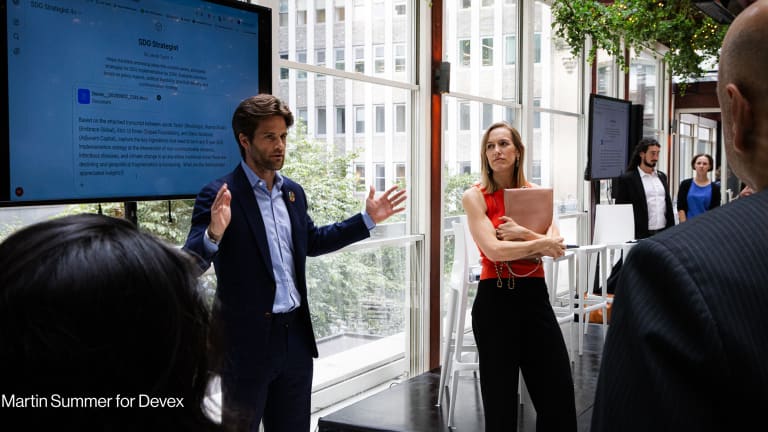
OXFORD, United Kingdom — To understand how emerging technologies such as automation and artificial intelligence can benefit the poorest, start with the problem, not the solution. That was a key takeaway from a session at the Skoll World Forum on Thursday called “Emerging Technologies: Shifting the Path from Poverty to Prosperity?”
Several of the themes that were discussed are likely to inform a new initiative launched by the Bill & Melinda Gates Foundation called Pathways for Prosperity: Commission on Technology and Inclusive Development.
The initiative is exploring the impact of rapid technological change on developing countries, and looking for the best ideas for how to navigate this future, in order to provide decision-makers with practical ideas to turn challenges into opportunities for the poorest, said Stefan Dercon, the former chief economist at the United Kingdom’s Department for International Development, who is now a professor of Oxford University Blavatnik School of Government and academic director of the joint initiative with the Gates Foundation.
“A lot of people working in the tech space, they are pushing technology for the sake of technology as a solution, and then looking for a problem they can apply to it,” Dercon said.
Other experts agreed that issues of technology and its impact were too easily — and unhelpfully — simplified.
“It’s sort of easy to reduce this question of pathways for prosperity to: ‘Will the robots take over my job or the job of the garment worker in Bangladesh?’” said Gargee Ghosh, director of development policy and finance at the Gates Foundation.
Ghosh said she is excited about the potential of technology to improve quality of life in areas such as health and agriculture and sanitation — but added that access “is not a given.” She described her work as “addressing the policy and financing challenges associated with uptake and access to new technologies.” And she said that increasingly she sees the potential for impact from “bundles of technology” that can address not just one problem but rather the “bottlenecks and breakdowns.”
The Pathways for Prosperity commission was launched in Nairobi, Kenya, in January by Melinda Gates, co-chair of the Gates Foundation; Sri Mulyani Indrawati, minister of finance in Indonesia; and Strive Masiyiwa, a London-based Zimbabwean philanthropist who founded the telecommunications company Econet.
Typically, solutions developed in cities such as London will not work for the majority of where the world population lives, Dercon said. But he added that he saw this conversation at Skoll as an opportunity to gather perspectives from expert panelists and a diverse audience of academics, social entrepreneurs, funders, and others.
One of the speakers was Terah Lyons, executive director of the nonprofit foundation the Partnership on AI, a multistakeholder organization developing best practices for responsible technology development. Conversations on AI “need to be global in scope” and include actors from different groups, including those without technical expertise, she emphasized.
She described a power imbalance between the private and public sector in addressing the challenges posed by meeting technology. Lyons said she is interested in how to build the capacity of civil society organizations, so they don’t just show up but rather are equipped with the tools they need to work together with the technology sector on this challenge.
Another panelist was Maryana Iskander, CEO of the Harambee Youth Employment Accelerator in South Africa, who made perhaps the obvious but often overlooked point that the impact of emerging new technologies varies country by country. Whereas automation may replace factory workers in some countries, it may create new opportunities for people in countries where those opportunities never materialized, she said. Iskander added she is working to get South African youth to imagine other less traditional pathways to employment.
The audience also learned more about the evolving approach to technology at the Gates Foundation, which Ghosh said has learned two big lessons, “sometimes the hard way.”
The first is the need to start by understanding the need, rather than beginning with the solution and thinking about the need later, Ghosh said. She shared a story about developing a rotating handheld planter that allowed farmers to plant more seeds.
“I’ve seen the new design — it’s super cool, but it’s not getting used. And it turns out that it’s too heavy. It’s too heavy for women, who are the main planters of this crop. We didn’t know that because we spent a lot of time in the community, but we talked to the men,” she said.
In hindsight, she said, “that was stupid.”
Second, no matter how good the product is, it is critical to have an equally good market access strategy, she said, explaining that policy and financing barriers inhibit the uptake of even the best technologies.
“Policy and market strategy are almost always as important as the product itself,” she said.
Dercon said one thing he thinks the whole group can agree on is the need to educate policymakers on these issues.
“It’s the nature of this topic that we have far more questions than sensibly people can answer,” he said.
Editor's note: Devex traveled to the Skoll World Forum with the support of the Skoll Foundation. Devex retains full editorial independence and responsibility for this content.








